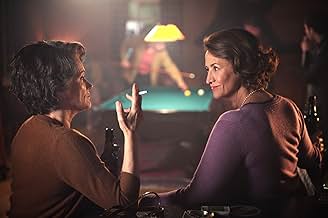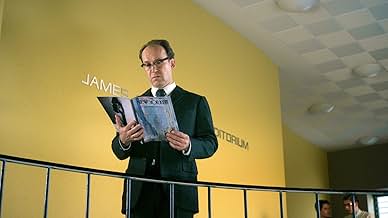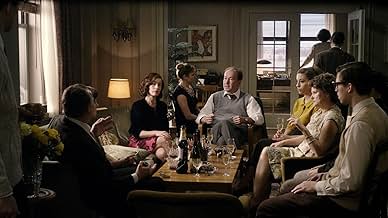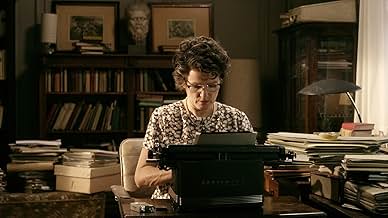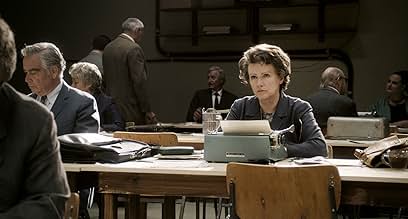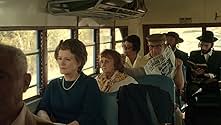Un documental sobre la vida y obra de Hannah arendt, la prolífica e inclasificable pensadora, teórico política, filósofa moral y polémica, y con su encuentro con el juicio de Eichmann un naz... Leer todoUn documental sobre la vida y obra de Hannah arendt, la prolífica e inclasificable pensadora, teórico política, filósofa moral y polémica, y con su encuentro con el juicio de Eichmann un nazi de alto rango.Un documental sobre la vida y obra de Hannah arendt, la prolífica e inclasificable pensadora, teórico política, filósofa moral y polémica, y con su encuentro con el juicio de Eichmann un nazi de alto rango.
- Dirección
- Guionistas
- Elenco
- Premios
- 8 premios ganados y 18 nominaciones en total
- Student Laureen
- (as Leila Schaus)
- Dirección
- Guionistas
- Todo el elenco y el equipo
- Producción, taquilla y más en IMDbPro
Opiniones destacadas
But the film, which shows Arendt as shocked to learn that she has hurt the feelings of many Jews, including long-time friends, does not reveal that she had broken with the Zionist leaders in 1942 when they called for a Jewish state rather than the bi-national Palestine she supported. The Zionists opposed measures to rescue Jews from the Nazis other than those that herded them to Palestine. They claimed, however, that their takeover of Palestine was all about saving Jews from a unique evil -- a claim unchallenged by most liberals as well as the Stalinist left. Arendt's analysis hit the Zionists' guilty conscience and undermined the rationale for their nationalist project. The film ignores these crucial political elements, and presents Arendt's strong defender and friend only as novelist "Mary" without disclosing that Mary McCarthy was an anti-Stalinist and anti-Zionist who called Zionism the "Jewish final solution."
Director Margarethe von Trotta's failure to explore this relevant history leaves her film interesting but superficial when it could have been brave and timely. Arendt's famous topic, thoughtless compliance with evildoers in power, needs our attention today more than ever. Fifty years after the "Banality of Evil" controversy, U.S. liberals and progressives are blindly uncritical of a leader who spies on millions and remotely executes foreigners and citizens in the name of national security. A militarily mighty Zionist state is still free to massacre innocents, shielded by this unquestioned U.S. power and the old sacred cow that Israel is the only safe haven for Jews. Arendt might have had some juicy comments about the "banality of filmmaking."
Rita Freed
All that said, and these are certainly ideas worth mulling over, this is a film for ideas and for philosophy buffs, not for film buffs. Why do I say this? Because this movie is slow, at least for American audiences. The beginning is confusing. We see a woman in New York but we don't know the date. She speaks German. We see a man get off of a bus heading to "Victoria" in the middle of nowhere. He is promptly kidnapped. We don't know when or where. Eventually, we learn the kidnapped man is Adolph Eichmann who is nabbed by the Mossad in Argentina in 1960. Much of the movie unfolds slowly. This is a film about thinking. It is not about doing much or feeling much. It is an intellectual film.
There's one semi-action scene in the film where a 1950s vehicle corners Arendt on the road where she is walking. Israeli secret agents pour out of the car and threaten Arendt, trying to prevent her from publishing her book about Eichmann. Based on someone knowledgeable, Professor Roger Berkowitz, academic director of the Hannah Arendt Center for Politics and the Humanities at Bard College in New York, it appears this scene was invented out of whole cloth to try to give the film at least some suspense. But that's not what this film is about.
It's about thinking and it's about the fearsome, word-and-thought-denying banality of evil and how Hannah Arendt was the first to identify this 20th-century pathology of the human psyche.
Thanks to the Camera Cinema Club in San Jose for showing this film.
Barbara Sukowa portrays the German Jewish philosopher during the period she covered the Adolf Eichmann trial in Israel for The New Yorker. The film confronts the controversy Arendt raised when (i) she redefined Eichmann not as a monster but as an ordinary nobody, exemplifying "the banality of evil," (ii) she reported that some Jews collaborated with the Nazis, resulting in more deaths than chaos would have caused, and (iii) she said she loves her friends but not any "people," in this case, the Jews. On all three counts she was condemned for abandoning her people. Today, at a remove from the heat of that moment, she was clearly correct on all counts. For more see www.yacowar.blogspot.com.
Not loving the Jews was not being anti-Semitic but refusing to emotionalize her consideration of the issues. Arendt was opposed to the blanket love of any group of people, not based on personal engagement, because such nationalist or other group identification precluded the thoughtful consideration of any issues around them. She most valued a rational, thoughtful approach that was not prejudged or proscribed by any -ism or convention. As for some Jews' collaboration, she simply reported facts that arose at the trial. (Indeed, Rudolf van den Berg's new film Suskind details precisely that collaboration.) Nor was that observation anti-Semitic, for the possibly well-intentioned collaboration in the face of horrid danger is a plausible response among any people. Arendt was pilloried for facing the facts and for rejecting myths. That's what historians are required to do and apparently what philosophers periodically have to remind them to do.
If that's what director Margarethe von Trotta had in mind when making this film, she succeeded. Her film documents an important chapter in the story of Arendt's life: her articles about the Eichmann trial in Jerusalem, and the ensuing tsunami of negative reactions. The reason for those negative reactions was the way Arendt regarded Eichmann: not as a monster, but as a man 'incapable of thinking', a dimwit who just followed orders. This fitted her theory of 'the banality of evil': the worst kinds of evil are often the result of not thinking for oneself.
Veteran actress Barbara Sukowa portrays Arendt as a difficult and complex woman, who is a brilliant philosopher but also stubborn, arrogant and single-minded. In one scene, we see her lying on a couch, when the phone rings. On the other end of the line is her editor, who faces a deadline and asks if she is making progress with the articles. 'Of course I'm working hard, and it would be nice if I could continue working instead of chatting on the phone', she answers. After that, she returns to the couch, lies down and continues smoking her cigarette.
Sometimes it seems that Arendt is incapable of feeling, just as Eichmann is incapable of thinking. Even when her best friends turn away from her, she continues insulting them by telling them 'she doesn't love the Jewish people'. She means it in a philosophical way - you can't love a people the way you love individuals. But nevertheless, it comes across as cold-hearted and insensitive.
Arendt is clearly an interesting person. But that doesn't make 'Hannah Arendt' an interesting film. From a cinematographic point of view, the movie doesn't have much to offer. It's a rather straightforward account of this episode in Arendt's life. The only thing that adds a little depth to the film are the flashbacks of the romantic affair she had with her teacher, the famous philosopher Martin Heidegger, who sympathized with the Nazis. The film suggests that this affair influenced the way she regarded Nazis such as Eichmann, but doesn't make this explicit. In my view, the film is interesting as a history lesson about this remarkable woman, but not as a great cinematographic experience.
This is a brooding and thought-provoking biographic drama about the notorious philosopher focusing mainly the Eichman trial . Stands out the wonderful acting by Barbara Sukowa who is terrific in the title role . Support cast is frankly excellent such as Axel Milberg as her husband Heinrich Blucher , Janet McTeer as the writer Mary McCarthy and Julia Jentsch as her helper , the latter also starred another good film about Nazism titled ¨Sophie Scholl¨ . The motion picture was well directed by Margarethe Von Trotta and it belongs a trilogy dealing with Nazism , formed by ¨Roxa Luxemburg¨ also starred by Barbara Sukowa and ¨Rosenstrasse¨or Street of roses .
The picture is based on real events about Hanna Arendt life ; Arendt's first major book was entitled, The Origins of Totalitarianism (1951), which traced the roots of Stalinist Communism and Nazism in both anti-Semitism and imperialism . In her reporting of the Eichmann trial for The New Yorker, which evolved into Eichmann in Jerusalem : A Report on the Banality of Evil (1963), she coined the phrase "the banality of evil" to describe Eichmann. She raised the question of whether evil is radical or simply a function of thoughtlessness, a tendency of ordinary people to obey orders and conform to mass opinion without a critical evaluation of the consequences of their actions and inaction.Arendt was sharply critical of the way the trial was conducted in Israel. She also was critical of the way that some Jewish leaders, notably M. C. Rumkowski, acted during the Holocaust. This caused a considerable controversy and even animosity toward Arendt in the Jewish community. Her friend Gershom Scholem, a major scholar of Jewish mysticism, broke off relations with her. Arendt was criticized by many Jewish public figures, who charged her with coldness and lack of sympathy for the victims of the Shoah/Holocaust. Due to this lingering criticism, her book has only recently been translated into Hebrew.
¿Sabías que…?
- TriviaFor a deeper understanding of this story, one might care to watch Operation Finale (2018), which depicts the undercover mission to find and extract Adolf Eichmann from Argentina and bring him to trial in Israel. Showing the background of an operation sanctioned by PM David Ben-Gurion, the film gives a glimpse of the complexity of Eichman's character, his futile attempts to justify his actions and tell his side of the story.
- ErroresWhen Arendt stands on the terrace of her hotel in Jerusalem at looks across the Valley of Hinnom at the Old City, there are Israel flags flying from the Tower of David complex. However, the Old City of Jerusalem was still under Jordanian control in 1961.
- Citas
Hannah Arendt: You describe a book I never wrote.
Siegfried Moses: A book that will never be allowed in Israel. And won't appear anywhere else either if you have any decency left.
Hannah Arendt: You ban books, and lecture me about decency!
- ConexionesFeatured in Kino Kino: Hannah Arendt (2013)
Selecciones populares
- How long is Hannah Arendt?Con tecnología de Alexa
Detalles
- Fecha de lanzamiento
- Países de origen
- Sitio oficial
- Idiomas
- También se conoce como
- 漢娜鄂蘭:真理無懼
- Locaciones de filmación
- Productoras
- Ver más créditos de la compañía en IMDbPro
Taquilla
- Total en EE. UU. y Canadá
- USD 717,205
- Fin de semana de estreno en EE. UU. y Canadá
- USD 31,270
- 2 jun 2013
- Total a nivel mundial
- USD 8,880,936
- Tiempo de ejecución
- 1h 53min(113 min)
- Color
- Mezcla de sonido
- Relación de aspecto
- 2.35 : 1





